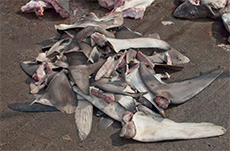




| Home | Features | Club Nights | Underwater Pics | Feedback | Non-Celebrity Diver | Events | 8 August 2025 |
| Blog | Archive | Medical FAQs | Competitions | Travel Offers | The Crew | Contact Us | MDC | LDC |

|

|
 
 |
  ISSUE 20 ARCHIVE - SHARKIPEDIARichard Peirce"We will never solve the problem of trying to reduce or regulate supply. Unless and until we do something about the demand, we will be fighting a losing battle". That quote came from a South African vet talking about the scourge of rhino poaching. It could just as easily have been me talking about the shark fin trade.Hard credible figures are difficult to come by, indeed are almost non-existent when it comes to the global harvesting of shark fins. For many years the only available scientifically researched figures were those provided by Dr. Shelley Clarke whose research started in 2000, and who concluded that the worldwide number of sharks killed each year for their fins was between 26 million and 73 million. Dr Clark's best guestimate figure was somewhere in the middle at 38 million. The highest figure I have seen in print is 200 million, and 100 million is the figure most often quoted. It may not be possible for scientists, activists, and conservation campaigners to agree a figure, and indeed figures are often manipulated to suit individual needs, but what can be agreed on is the trend. Ninety five per cent of the world's shark fins are consumed by China. At the height of its popularity shark fin soup was costing up to £180 a bowl, and in markets fins were selling for more than $700 a kilo. When I visited Beijing in 2011 it was to present Shark Trust "Shark Champion" awards to three people who were proposing measures to the two Chinese legislative bodies to ban the import of shark fins. My visit convinced me that not only would change come in China but it would be home-grown Chinese change. The big question was whether change would come fast enough to relieve the pressure on vulnerable shark populations. On my visit I was told that by the end of fifteen years the number of Chinese middle class consumers would have risen by 250 million. For sharks and other wildlife, hard pressed by Chinese demand, this increase in consumers almost made conservation seem like mission impossible, however there were many people at work in China who didn't believe in "mission impossible". The San Francisco based wildlife campaigning group WildAid has been quietly working away in China for years. In 2006 WildAid recruited one of China's leading celebrities to lead a public awareness campaign. Yao Min was a professional basketball player who played for the Houston Rockets. His graphic TV ads had a profound effect on Chinese young people, and other Chinese celebrities joined the awareness movement. From another angle Chinese businessman turned environmentalist, Jim Zhang, began working towards seeking a ban on fin imports. Zhang was joined by two fellow members of the exclusive Entrepreneurs Club, Mr Wan Jie and Mr Ding Liguo, and in 2011 they put a proposal before China's legislative assemblies. The initial proposal met with opposition and was rejected, but in July 2012 the government agreed to ban shark fin soup from all official government banquets within three years. Then in a separate but related move, and as part of its campaign against extravagant government spending, orders were given to officials throughout China to ban lavish banquets serving luxury and exotic foods. Only ordinary foods would be served and this was a very positive step for sharks and other wildlife. In September 2012 the government of Hong Kong followed suit with similar instructions to "demonstrate its commitment to green living and sustainability". Chinese state TV carried reports that restaurants were serving up fake shark fin soup using gelatine, seaweed gum and starch. There were also reports that many soup samples had been found to contain dangerous levels of cadmium and methyl mercury. The effects of these actions were soon evident and in February 2013 China's Ministry of Commerce reported a 70% reduction in consumption over the 2013 Spring. In interviews in October carried out at Beijing's Lianhong Marine Dry Products Market some traders reported that trade in shark fins was down by 70%. In Hong Kong there were reports that imports of shark fins had declined by 20%—30% and that prices for fins had dropped by similar percentages. Across the Far East hotels, airlines and restaurants are removing shark fin soup from their menus. In China itself there are reports of specialist restaurants in Beijing and Shanghai closing down, and others taking the soup off their menus. While the Chinese government and individual campaigners have been working to reduce demand, others around the world have acted to reduce supply. In 2013 the EU Fins Naturally Attached (FNA) legislation effectively ended "finning" in EU waters, and by EU vessels wherever they fished. Shark parks and sanctuaries were set up in the British Indian Ocean Territories (around the Chagos Islands), the Maldives, Mexico, Honduras and others. California banned the sale, possession, trade or distribution of fins, and this year New Zealand will put into law a complete ban on shark finning. When the Chinese government banned shark fin soup at official functions it indicated disapproval, and this together with action from people like Yao Min has had a huge influence. Now among China's young affluent professional classes, eating shark fin soup is rapidly becoming socially unacceptable — uncool. My 2011 visit to China convinced me that trying to limit supply was almost a waste of time. The only way to save the world's sharks was to reduce or eliminate demand. The indications are that demand is falling, and while it's far too early to breathe a sigh of relief and say that the world's sharks have now been saved, there are grounds for real optimism. Western Australia's shark culling policy earlier this year attracted widespread condemnation and was demonstrated against in many places around the world. The setting of a row of drum lines to protect beaches was in many ways a barmy idea that could have attracted sharks to the very beaches they were there to protect. Drum lines catch sharks, any sharks, and any other marine animals that will bite a baited hook. This means that every time a shark or any other animal was caught on a hook, it struggled, it bled and it gave off distress signals that attracted guess what? – more sharks! As soon as they have caught something drum lines effectively became chum stations. The policy of releasing small sharks may have been a laudable idea but it didn't work. Some sharks were already dead, and others that were released probably didn't survive. Geremy Cliff at the Natal (KZN) Sharks Board in Durban admitted to me that Durban's nets were as much about politics as they were about protecting beaches from sharks. The Western Australia Premier Colin Barnett is a politician who has taken it upon himself to "protect" W.A. beaches. I wonder if the drum lines are doing a better job protecting his political position than they are protecting his beaches? I am writing this in early April. Spring has sprung, and after the wettest winter in years, Britain deserves a decent summer. Basking sharks, blue sharks, and many smaller species can be seen and enjoyed by divers in British waters so good diving, good luck, and good sharks. Go well, Richard. |